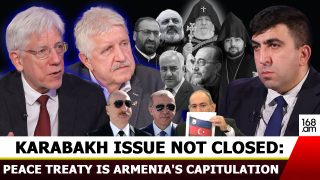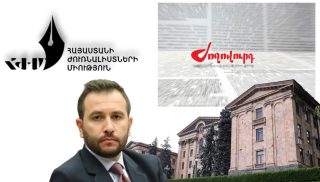Armenian Genocide 1915 Commemorated in Ottawa

On April 24, 2016, the Armenian community of Canada came together in Ottawa to commemorate the 101 st year of the Armenian Genocide perpetrated by the Ottoman Empire in 1915. The commemoration started with speeches at Ottawa’s Parliament Hill near the building of the Canadian Parliament, and continued to the Turkish Embassy, where speakers addressed the Embassy with their demand for recognition of the Armenian Genocide.

Armen Eganyan, Ambassador of Armenia to Canada, said in his speech that it is because of the failure to recognize and condemn the Armenian Genocide that a precedent of racial extermination as a tool of state policy was established, further stretching to the times of the holocaust, Rwandan and other genocides, and today the same elements continue being used by so-called ISIS in the Middle East.
Oscar Gasana of the Humura Association of Canada spoke about the Rwandan genocide and its connection with atrocities that happened before. Mr. Gasana said that genocide doesn’t end with killing people – the last phase of perpetrating genocide is denial.

While Mr. Gasana was speaking about denial as the final phase of genocide perpetration, people gathered in a distance were holding Turkish and Azerbaijani flags speaking denialist statements with a loudspeaker, making every efforts to speak louder than the speakers in front of them commemorating the Armenian genocide. The counter-protest crowd was holding the same posters from the previous year as even some of them contained old messages such as “Who supports Iran: Armenia.” The same poster was photographed last year, when Iran was under sanctions and the purpose of the poster was to position Iran in a negative light as a non-democratic state and claim that by maintaining constructive relations Iran, Armenia had to be perceived in a negative light too. Ironically, on April 20, four days before the commemoration event, Horizon Weekly of Toronto published an article with reference to a reliable source claiming that the Turkish Embassy had offered 150 dollars per person to those who would come to Ottawa to hold Turkish and Azerbaijani flags in a counter-protest.
After the speeches at the Parliament Hill, the group that consisted of Armenians, Assyrians, Greeks and other communities in Canada marched to the Turkish Embassy, where the commemoration event would continue to demand recognition of the genocide from the Turkish Embassy.
All generations were marching together and chanting words demanding recognition of the Armenian genocide of 1915-1923 that took the lives of one and half million people, destroying their culture and heritage.

Meline Pehlivanian had crossed a long distance to participate in the commemoration event, where her family was helping to move her wheelchair. Meline Pehlivanian said she had lost family in the genocide, and every year she comes to Ottawa on April 24 to demand justice. “I immigrated to Canada from Lebanon. My family was from Arabkir. My grandparents were deported at the age of four and five. My grandfather, Khachatour Pehlivanian, was adopted by a Kurdish family when he was four. They kept him as a shepherd for their animals. He was thirteen when he learned that he was Armenian, and he decided to run away and find escape somewhere else. He left for Aleppo, and after suffering difficulties, he continued his way to Lebanon, where he found the grandchildren of his uncle and he decided to stay there. My mother was an orphan in Arabkir, and later she ended up in Lebanon somehow, where she met my father. Later they were sent to America as orphans,” said Meline Pehlivanian about how her family escaped from the Armenian genocide and ended up in America.
As the Armenian group was gathering in the vicinity of the Turkish Embassy, behind metallic barricades and police officers a group of Turkish and Azerbaijani people were waving their flags and chanting denialist statements. As the Turks were making efforts to speak louder to press down the voices of Armenians that were reading poems to commemorate the memory of the victims, I saw a familiar face near the metallic barricades; I saw a man I first noticed four years ago, and then would see him every year on April 24 in the same place. I told myself, “next year I come, this man will be standing here again.” This time he looked different – he was not cursing in Turkish. He was standing behind the metallic barricades separating Armenians from Turks for a long time.

I was unable to read the expression of his eyes; the only thing I could notice was that his face was very kind when he was talking to other people, but when he was turning back and looking at the Turkish flags and people holding them, the expression of his face was changing immediately – his face was loosing the kind expression, and his cheek was shivering. I decided to ask his family story. “My name is Khosrov Khrimian,” said the man, “My father’s family was from Smyrna. My mother’s family was from Kayseri. During massacres in 1920 my mother escaped to Greece. Her father had been taken to the Turkish army to fight in the Crimea, but he escaped and went to the mountains to join volunteer fighters. When the news came to his village, and the Turks found out about his escape, to punish him they hang his brother. My mother passed away four months ago, and on her tomb it is written 1922-2016. Her birth year is written 1922 because that’s the time when she got papers and identity in Greece. This is the story of my mother’s side. My grandfather from my father’s side was an intelligent man and a municipal government official in Smyrna. When the troubles started, he thought it was going to be periodical, and things would come back to normal as it was a multi-cultural city with developed cultural life, and he was not expecting such troubles could happen. He sent his wife with his five children to Greece for them to go and see how things were going to be till he would decide what to do. It was in 1921. Shortly, when tensions grew, my grandfather was suggested by his Turkish friends to become a teacher but he had to change his religion and convert to Muslim religion. He refused to convert from Christianity to Muslim religion, and he was publicly hanged. My mother and father met in Greece.” In answer to my question what he was feeling when looking at the Turkish counter-protest, Khosrov Khrimian said, “The last two times I had a fight as I was cursing them in Turkish language. Today I feel sorry for them… because I see what’s going on in Turkey. I don’t see them having a bright future. Sooner or later Turkey will be dismantled; I can already see these signs today, which is why I did not argue with them this time as I felt sorry for them. Today I decided not to show anger as I really feel sorry for them. Today the whole world is recognizing the Armenian genocide, but they do not have even courage to recognize and leave it behind.
There are intelligent Turkish people who recognize, but what happens to them? They kill them or put them in jail… You can fight the truth, but you cannot kill the truth. Soon or later the Armenian genocide will be recognized, and I hope it is done very soon first of all for the Turkish people so that they can release this guilt from their souls. I have no hatred to them; I feel sorry for them…”.

After the commemoration event as the crowds were dissolving, I saw a young lady who had crossed a long way to take part in the commemoration event, and walked several kilometers distance with crutches as her leg was broken. When you look at her, you understand that the energy that helped her to walk such a long distance with a broken leg and chant louder than anybody else will never be lost and will be transferred from generation to generation, and her children too will come here every year on April 24 to demand justice with the same energy.
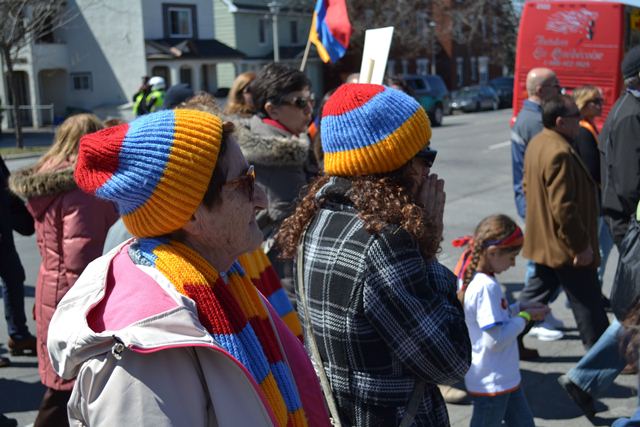
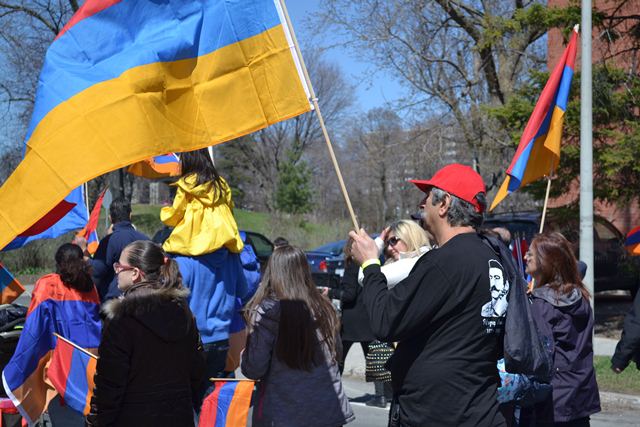
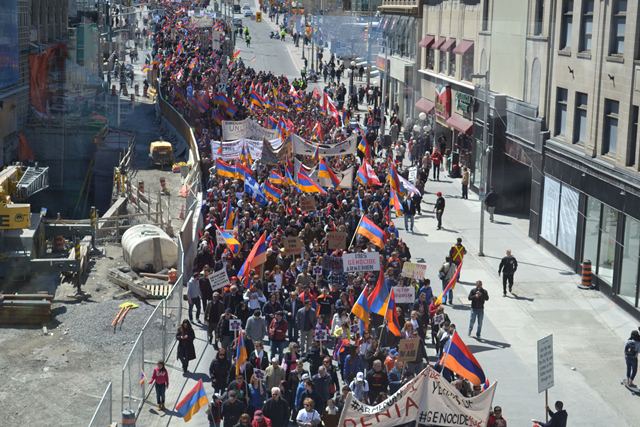
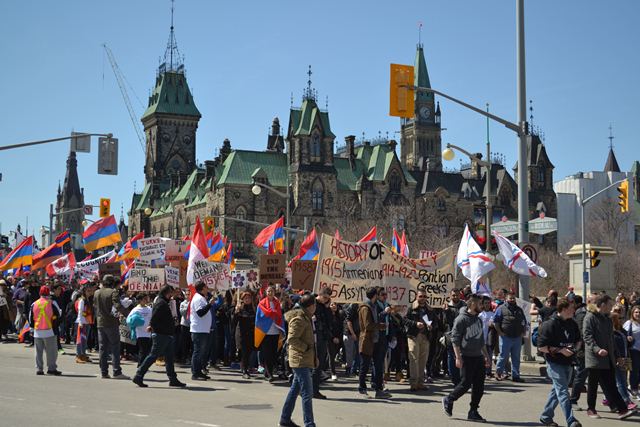
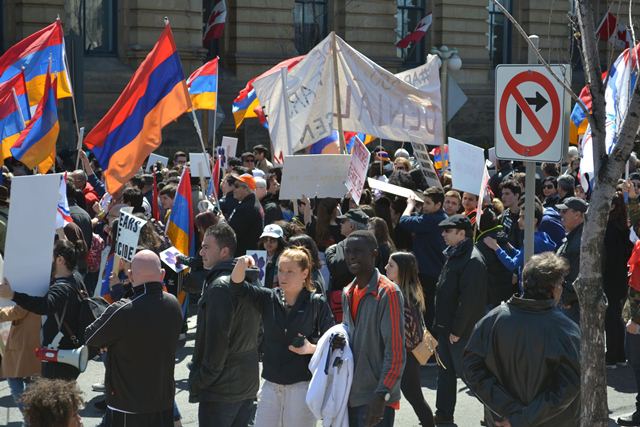
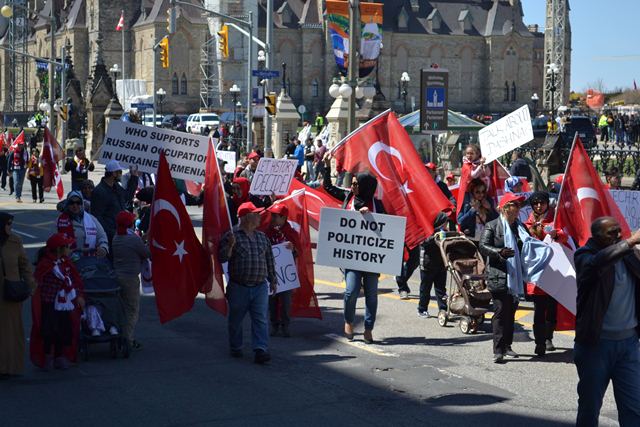
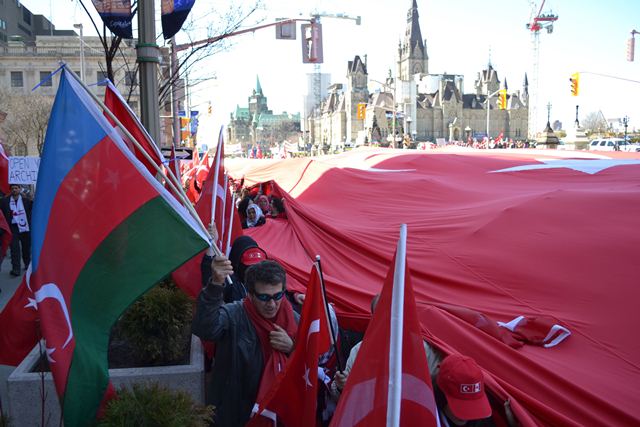
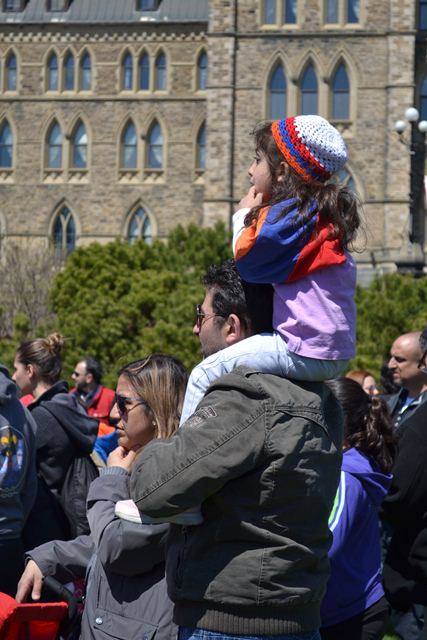
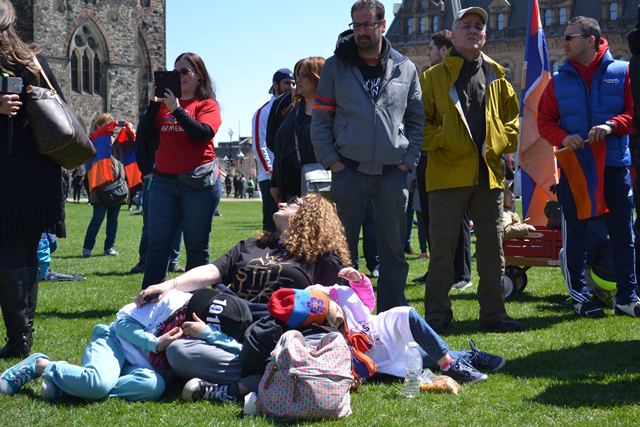
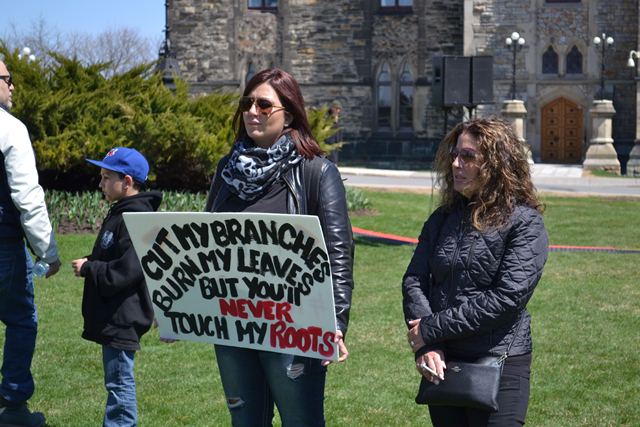
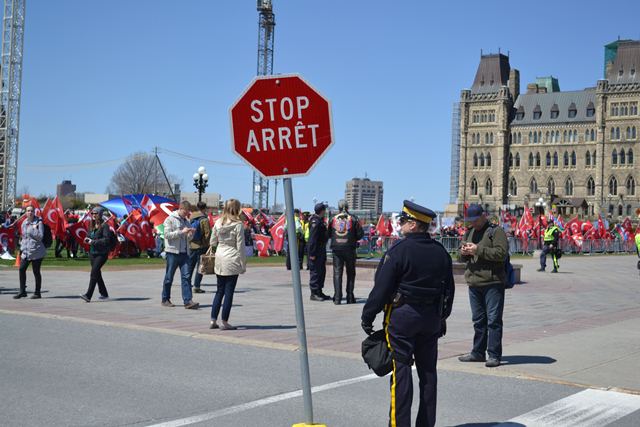
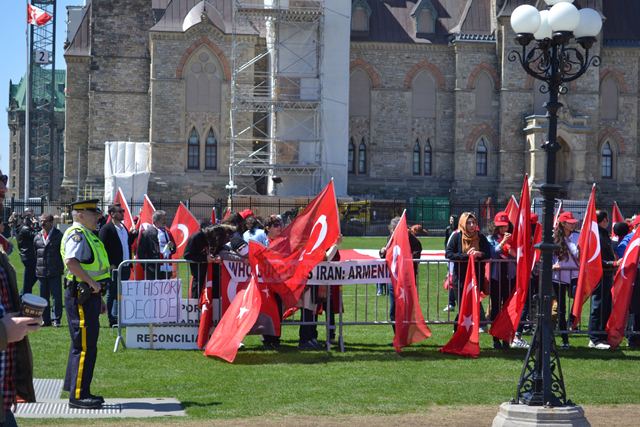
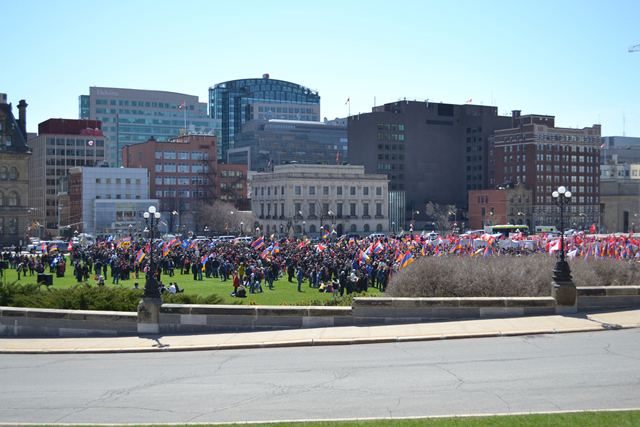
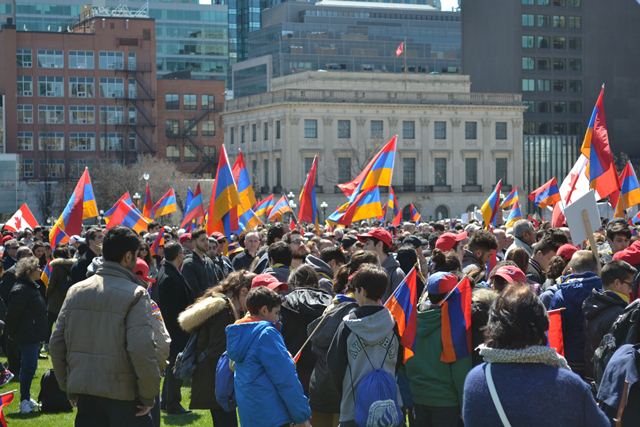
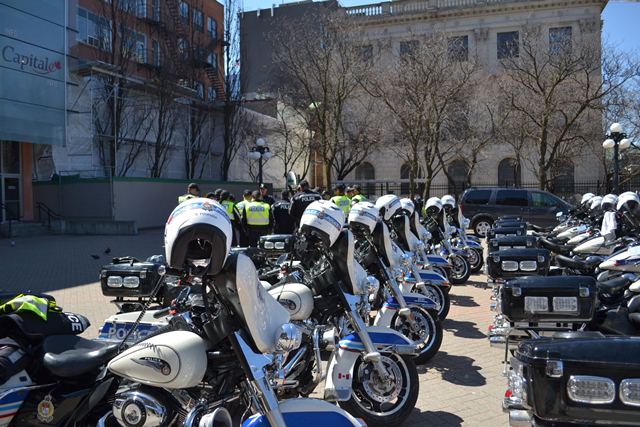
By Kamo Mailyan,
Ottawa-Yerevan
Exclusively for 168 Hours
P.S. Canada is among the countries that have recognized the Armenian genocide. This year the head of the Canadian new Government, Justin Trudeau, reaffirmed the Canadian government’s commitment to human rights values and recognition of the Armenian genocide.









